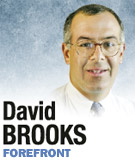Subscriber Benefit
As a subscriber you can listen to articles at work, in the car, or while you work out. Subscribe Now
 The historian Walter Russell Mead recently noted that after the 1990s revolution that collapsed the Soviet Union, Russians had a saying that seems particularly apt today: “It’s easier to turn an aquarium into fish soup than to turn fish soup into an aquarium.”
The historian Walter Russell Mead recently noted that after the 1990s revolution that collapsed the Soviet Union, Russians had a saying that seems particularly apt today: “It’s easier to turn an aquarium into fish soup than to turn fish soup into an aquarium.”
Indeed, from Europe to the Middle East, and maybe soon even to Russia and Asia, a lot of aquariums are being turned into fish soup. But turning them back into stable societies and communities will be one of the great challenges of our time.
We are present again at one of those great unravelings—just like after World War I, World War II and the cold war. But this time all of these states have been pulled down from within—without warning. Why?
The main driver, I believe, is the merger of globalization and the information technology revolution. Both achieved a critical mass in the first decade of the 21st century that has resulted in the democratization—all at once—of so many things that neither weak states nor weak companies can stand against.
We’ve seen the democratization of information, where everyone is now a publisher and the democratization of innovation, wherein startups using free open-source software and “the cloud” can challenge global companies.
And, finally, we’ve seen what Mark Mykleby, a retired Marine colonel and former adviser to the chairman of the Joint Chiefs of Staff, calls “the democratization of expectations”—the expectation that all individuals should be able to participate in shaping their own career, citizenship and future, and not be constricted.
I’ve been struck by how similar the remarks by Russians about Prime Minister Vladimir Putin, who just basically reappointed himself president, are to those I heard from Egyptians about Hosni Mubarak, who kept reappointing himself president.
“The days of leading countries or companies via a one-way conversation are over,” says Dov Seidman, the CEO of LRN and the author of the book “How.” Seidman continued, “The old system of ‘command and control’—using carrots and sticks—to exert power over people is fast being replaced by ‘connect and collaborate’—to generate power through people. Now you have to have a two-way conversation that connects deeply with your citizens or customers or employees.”
Netflix had a one-way conversation about raising prices with its customers, who instantly self-organized; some 800,000 bolted, and the stock plunged. Putin thought he had power over his people and could impose whatever he wanted and is now being forced into a conversation to justify staying in power.
A lot of CEO’s will tell you that this shift has taken them by surprise, and they are finding it hard to adjust to the new power relationships with customers and employees.
“As power shifts to individuals,” argues Seidman, “leadership itself must shift with it—from coercive or motivational leadership that uses sticks or carrots to extract performance and allegiance out of people to inspirational leadership that inspires commitment and innovation and hope in people.”
The role of the leader now is to get the best of what is coming up from below and then meld it with a vision from above. Are you listening, Putin?
This kind of leadership is especially critical today, adds Seidman, “when people are creating a lot of ‘freedom from’ things—freedom from oppression or whatever system is in their way—but have not yet scaled the values and built the institutional frameworks that enable “freedom to”—freedom to build a career, a business or a meaningful life.”
One can see this vividly in Egypt, where the bottom-up democracy movement was strong enough to oust Mubarak but now faces the long, arduous process of building new institutions and writing a new social contract from a democracy coalition that encompass the Muslim Brotherhood, Christian liberals, Muslim liberals, the army and ultraconservative Muslim Salafis.
Getting all those fish back and swimming together in one aquarium will be no small task—one that will take a very courageous and special leader. Help wanted.•
__________
Brooks is a New York Times columnist. Send comments on this column to [email protected].
Please enable JavaScript to view this content.
